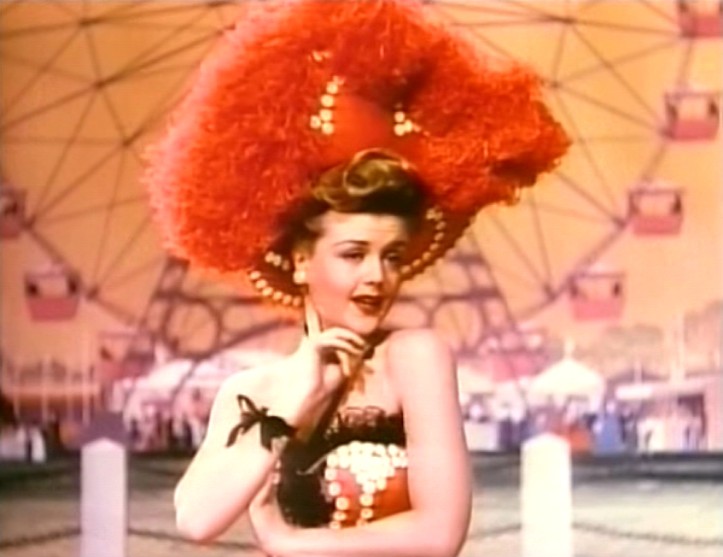
Angela Lansbury has been a prominent actress in movies, on stage, and on television for seventy years. She was born on October 16, 1929 in London, England. The daughter of an actress, she was enrolled in the Ritman School of Dancing and then the Webber Douglas School of Singing and Dramatic Art. Just before the Germans bombed London, she and her mother and brothers managed to move to North America. They fled to Montreal, and then moved to New York City. From New York, they moved West to Hollywood. Here, she met Mel Ballerino, the man who would cast her in her first film roles. Her first appearance on screen was in the 1944 film Gaslight, for which she received nomination for Best Supporting Role for her portrayal of Nancy. She was also featured in The Picture of Dorian Gray in 1945, for which she received a Golden Globe for Best Supporting Actress and a nomination for an Academy Award for Best Supporting Actress. She went on to a great deal of success in both film and on the stage. Notable film appearances include her role as Ms Iselin in the Manchurian Candidate, for which she won the National Board of Review Award for Best Supporting Actress, her role as Miss Price in Bedknobs and Broomsticks, and her voice role as Mrs. Potts in The Beauty and The Beast. In all Angela Lansbury has appeared in fifty-two films, been nominated for twelve awards for these roles, and won five of these awards. Her first role on stage was in 1957 on Broadway in Hotel Paradisio. Her musical debut was in Anyone Can Whistle, the musical by Stephen Sondheim. In 1966 she won the Tony for Best Actress in a Musical for her part as the title role in Mame. Other stage roles include Mama Rose in Gypsy, for which she won the Tony and the Drama Desk Award for Best Leading Actress in a Musical; Mrs. Lovett, for which she won another Tony and another Drama Desk Award for Best Leading Actress in a Musical; Madame Arcati in The Blithe Spirit, for which she won the Tony and the Drama Desk Award for Best Featured Actress in a Play; and Madame Armfeldt in a Little Night Music, which she is still performing in at 84 years of age. In all, she has been nominated for ten awards for these roles, and has won eight of those awards. Lansbury's success has also been extended to television. Her television debut was in 1982, when she played Gertrude Vanderbilt Whitney in a miniseries called Little Gloria...Happy at Last. She portrayed Jessica Fletcher, crime writer, in a television show called Murder, She Wrote from 1884 to 1996. This is perhaps the role she is best known for by the general public. She has done several other shows, miniseries, and guest appearances since then, most recently appearing on Law & Order: SVU as Eleanor Duvall, a role for which she was nominated for an Emmy for Outstanding Guest Actress in a Drama. Over the years, she has been nominate 28 times. She has won at least five of these awards, which include Emmys, Golden Globes, and CableACE Awards. In 1995, Lansbury was named a Disney Legend. She has a star on the Walk of Fame, and she received the Screen Actors Guild Lifetime Achievement Award in 1997, New Dramatists Lifetime Achievement Award in 2000, The Acting Company's First Lifetime Achievement Award in 2002, The Actor's Fund of America Lifetime Achievement Award in 2004, an honorary Doctor of Humane Letters from the University of Miami, and a George and Ira Gershwin Award for Lifetime Musical Achievement. In 1994, Queen Elizabeth II appointed Angela Lansbury a Commander of the Order of the British Empire.

The great expanse of this woman's work and the many many honors that have been bestowed upon her over the years speak to just what an incredible artist she is. Her versatility and talent have carried her through role after role through the years, and her talent and charm only grow with her age. She still possesses that adorable smile that made casting directors love her so much in the 40s and 50s. She has the warm voice of a mother figure, both in speaking and singing, that makes audiences trust her and root for her implicitly. She has an approachable and relatable beauty and charm that has given her a special place in the hearts of the American people. Whether you knew her first as Mrs. Lovett or Jessica Fletcher or Mrs. Potts (like me!), you loved her. She was even adorable and charming and motherly as the maniacal Mrs. Lovett. She brings a certain something special to each role, and Broadway will lose one of its most legendary and gifted performers when she is no longer on the scene.

 &
& , Nikki
, Nikki &
& , Nikki
, Nikki









 Angela Lansbury has been a prominent actress in movies, on stage, and on television for seventy years. She was born on October 16, 1929 in London, England. The daughter of an actress, she was enrolled in the Ritman School of Dancing and then the Webber Douglas School of Singing and Dramatic Art. Just before the Germans bombed London, she and her mother and brothers managed to move to North America. They fled to Montreal, and then moved to New York City. From New York, they moved West to Hollywood. Here, she met Mel Ballerino, the man who would cast her in her first film roles. Her first appearance on screen was in the 1944 film Gaslight, for which she received nomination for Best Supporting Role for her portrayal of Nancy. She was also featured in The Picture of Dorian Gray in 1945, for which she received a Golden Globe for Best Supporting Actress and a nomination for an Academy Award for Best Supporting Actress. She went on to a great deal of success in both film and on the stage. Notable film appearances include her role as Ms Iselin in the Manchurian Candidate, for which she won the National Board of Review Award for Best Supporting Actress, her role as Miss Price in Bedknobs and Broomsticks, and her voice role as Mrs. Potts in The Beauty and The Beast. In all Angela Lansbury has appeared in fifty-two films, been nominated for twelve awards for these roles, and won five of these awards. Her first role on stage was in 1957 on Broadway in Hotel Paradisio. Her musical debut was in Anyone Can Whistle, the musical by Stephen Sondheim. In 1966 she won the Tony for Best Actress in a Musical for her part as the title role in Mame. Other stage roles include Mama Rose in Gypsy, for which she won the Tony and the Drama Desk Award for Best Leading Actress in a Musical; Mrs. Lovett, for which she won another Tony and another Drama Desk Award for Best Leading Actress in a Musical; Madame Arcati in The Blithe Spirit, for which she won the Tony and the Drama Desk Award for Best Featured Actress in a Play; and Madame Armfeldt in a Little Night Music, which she is still performing in at 84 years of age. In all, she has been nominated for ten awards for these roles, and has won eight of those awards. Lansbury's success has also been extended to television. Her television debut was in 1982, when she played Gertrude Vanderbilt Whitney in a miniseries called Little Gloria...Happy at Last. She portrayed Jessica Fletcher, crime writer, in a television show called Murder, She Wrote from 1884 to 1996. This is perhaps the role she is best known for by the general public. She has done several other shows, miniseries, and guest appearances since then, most recently appearing on Law & Order: SVU as Eleanor Duvall, a role for which she was nominated for an Emmy for Outstanding Guest Actress in a Drama. Over the years, she has been nominate 28 times. She has won at least five of these awards, which include Emmys, Golden Globes, and CableACE Awards. In 1995, Lansbury was named a Disney Legend. She has a star on the Walk of Fame, and she received the Screen Actors Guild Lifetime Achievement Award in 1997, New Dramatists Lifetime Achievement Award in 2000, The Acting Company's First Lifetime Achievement Award in 2002, The Actor's Fund of America Lifetime Achievement Award in 2004, an honorary Doctor of Humane Letters from the University of Miami, and a George and Ira Gershwin Award for Lifetime Musical Achievement. In 1994, Queen Elizabeth II appointed Angela Lansbury a Commander of the Order of the British Empire.
Angela Lansbury has been a prominent actress in movies, on stage, and on television for seventy years. She was born on October 16, 1929 in London, England. The daughter of an actress, she was enrolled in the Ritman School of Dancing and then the Webber Douglas School of Singing and Dramatic Art. Just before the Germans bombed London, she and her mother and brothers managed to move to North America. They fled to Montreal, and then moved to New York City. From New York, they moved West to Hollywood. Here, she met Mel Ballerino, the man who would cast her in her first film roles. Her first appearance on screen was in the 1944 film Gaslight, for which she received nomination for Best Supporting Role for her portrayal of Nancy. She was also featured in The Picture of Dorian Gray in 1945, for which she received a Golden Globe for Best Supporting Actress and a nomination for an Academy Award for Best Supporting Actress. She went on to a great deal of success in both film and on the stage. Notable film appearances include her role as Ms Iselin in the Manchurian Candidate, for which she won the National Board of Review Award for Best Supporting Actress, her role as Miss Price in Bedknobs and Broomsticks, and her voice role as Mrs. Potts in The Beauty and The Beast. In all Angela Lansbury has appeared in fifty-two films, been nominated for twelve awards for these roles, and won five of these awards. Her first role on stage was in 1957 on Broadway in Hotel Paradisio. Her musical debut was in Anyone Can Whistle, the musical by Stephen Sondheim. In 1966 she won the Tony for Best Actress in a Musical for her part as the title role in Mame. Other stage roles include Mama Rose in Gypsy, for which she won the Tony and the Drama Desk Award for Best Leading Actress in a Musical; Mrs. Lovett, for which she won another Tony and another Drama Desk Award for Best Leading Actress in a Musical; Madame Arcati in The Blithe Spirit, for which she won the Tony and the Drama Desk Award for Best Featured Actress in a Play; and Madame Armfeldt in a Little Night Music, which she is still performing in at 84 years of age. In all, she has been nominated for ten awards for these roles, and has won eight of those awards. Lansbury's success has also been extended to television. Her television debut was in 1982, when she played Gertrude Vanderbilt Whitney in a miniseries called Little Gloria...Happy at Last. She portrayed Jessica Fletcher, crime writer, in a television show called Murder, She Wrote from 1884 to 1996. This is perhaps the role she is best known for by the general public. She has done several other shows, miniseries, and guest appearances since then, most recently appearing on Law & Order: SVU as Eleanor Duvall, a role for which she was nominated for an Emmy for Outstanding Guest Actress in a Drama. Over the years, she has been nominate 28 times. She has won at least five of these awards, which include Emmys, Golden Globes, and CableACE Awards. In 1995, Lansbury was named a Disney Legend. She has a star on the Walk of Fame, and she received the Screen Actors Guild Lifetime Achievement Award in 1997, New Dramatists Lifetime Achievement Award in 2000, The Acting Company's First Lifetime Achievement Award in 2002, The Actor's Fund of America Lifetime Achievement Award in 2004, an honorary Doctor of Humane Letters from the University of Miami, and a George and Ira Gershwin Award for Lifetime Musical Achievement. In 1994, Queen Elizabeth II appointed Angela Lansbury a Commander of the Order of the British Empire.

 This wall is lined from left to right in gray filing cabinets about five or six cabinets high.
This wall is lined from left to right in gray filing cabinets about five or six cabinets high. There are three windows along the wall, above the filing cabinets- left, right, and center. They are barred.
There are three windows along the wall, above the filing cabinets- left, right, and center. They are barred.  Mid stage left, there is a large dark wooden desk, totally covered in stacks of papers and a large computer.
Mid stage left, there is a large dark wooden desk, totally covered in stacks of papers and a large computer.  Behind the desk is a very large and comfortable looking desk chair.
Behind the desk is a very large and comfortable looking desk chair. Center stage there is a rather large wooden coffee table painted 70s orange with a few books or magazines on it.
Center stage there is a rather large wooden coffee table painted 70s orange with a few books or magazines on it.  There are low blue benches on either end of the coffee table.
There are low blue benches on either end of the coffee table.
 Mid stage right there is an "L" formation of arm chairs-one line facing left and one line facing front. There would be five or six chairs in each line. The chairs are in varying colors-purple, blue, green, red, yellow, orange.
Mid stage right there is an "L" formation of arm chairs-one line facing left and one line facing front. There would be five or six chairs in each line. The chairs are in varying colors-purple, blue, green, red, yellow, orange.  The wild color scheme-or lack thereof- gives the sense that the principal is trying to relate to the young people, but isn't really succeeding very well. There should be general clutter about. A trashcan should be placed next to the desk- your typical olive green metal wastebasket.
The wild color scheme-or lack thereof- gives the sense that the principal is trying to relate to the young people, but isn't really succeeding very well. There should be general clutter about. A trashcan should be placed next to the desk- your typical olive green metal wastebasket. In the beginning, some students need to be sitting outside the principal's office. This effect could be achieved in a regular proscenium style space by creating a small 8 foot by 3 foot platform that would extend out from the stage on the far stage right. It would be wooden and painted to match the stage. Four chairs matching those inside the principal's office could be placed on this platform.
In the beginning, some students need to be sitting outside the principal's office. This effect could be achieved in a regular proscenium style space by creating a small 8 foot by 3 foot platform that would extend out from the stage on the far stage right. It would be wooden and painted to match the stage. Four chairs matching those inside the principal's office could be placed on this platform.